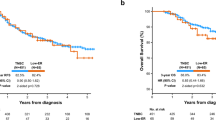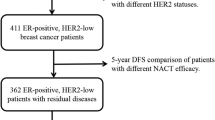Abstract
Purpose
Many patients with early breast cancer (eBC) undergoing neoadjuvant chemotherapy do not achieve pathological complete response (pCR), which is a prognostic factor. We examined the role of HER2-low expression in predicting pCR and prognosis in HER2-negative eBC.
Methods
We evaluated patients with stage I-III HER2-negative BC, treated between 2013 and 2023 at The Royal Marsden NHS Foundation Trust, London. Tumors were classified based on estrogen receptor (ER) status and into HER2-low and HER2-zero subgroups. We analyzed pCR rates, relapse-free survival (RFS) and overall survival (OS).
Results
754 patients were included in the analysis. pCR rate was 8.9% in the ER+ /HER2-low, 16.5% in the ER+ /HER2-zero, 38.9% in the ER- ER-/HER2-low and 35.9% in the ER-/HER2-zero eBC (p < 0.001). Multivariable analysis showed a significantly lower pCR rate in HER2-low compared to HER2-zero BC in the ER+ subgroup. At a median follow-up of 63.8 months (59.9–67.4), we observed longer OS in HER2-low compared to HER2-zero patients in the overall and in the ER+ population. There was no predictive or prognostic impact of HER2-low status in the ER- population.
Conclusion
This study supports the interpretation of HER2 status as a possible prognostic and predictive biomarker for HER2-negative eBC, especially among patients with ER+ disease.


Similar content being viewed by others
Data availability
The datasets used and/or analyzed during the current study are available from the corresponding author on reasonable request.
References
Cortazar P et al (2014) Pathological complete response and long-term clinical benefit in breast cancer: The CTNeoBC pooled analysis. The Lancet. https://clinicaltrials.gov/study/NCT04622319#study-record-dates
Gentile D et al (2023) Pathologic response and residual tumor cellularity after neo-adjuvant chemotherapy predict prognosis in breast cancer patients. Breast. https://clinicaltrials.gov/study/NCT04622319#study-record-dates
Haque W, Verma V, Hatch S, Suzanne Klimberg V, Brian Butler E, The BS (2018) Response rates and pathologic complete response by breast cancer molecular subtype following neoadjuvant chemotherapy. Breast Cancer Res Treat. https://clinicaltrials.gov/study/NCT04622319#study-record-dates
Battisti NML et al (2020) Pathological complete response to neoadjuvant systemic therapy in 789 early and locally advanced breast cancer patients: The Royal Marsden experience. Breast Cancer Res Treat. https://clinicaltrials.gov/study/NCT04622319#study-record-dates
Schmid P et al (2020) Pembrolizumab for early triple-negative breast cancer. New Engl J Med. https://clinicaltrials.gov/study/NCT04622319#study-record-dates
Derouane F et al (2022) Predictive biomarkers of response to neoadjuvant chemotherapy in breast cancer: current and future perspectives for precision medicine. Cancers (Basel) 14(16). https://doi.org/10.3390/cancers14163876.
Schlam I, Tolaney SM, Tarantino P (2023) How I treat HER2-low advanced breast cancer. Breast 67:116–123. https://doi.org/10.1016/j.breast.2023.01.005
Modi S et al (2022) Trastuzumab deruxtecan in previously treated HER2-low advanced breast cancer. N Engl J Med 387(1):9–20. https://doi.org/10.1056/nejmoa2203690
Trastuzumab Deruxtecan (T-DXd) alone or in sequence with THP, Versus Standard Treatment (ddAC-THP), in HER2-positive early breast cancer. https://clinicaltrials.gov/study/NCT05113251
A Study of Trastuzumab Deruxtecan (T-DXd) Versus Trastuzumab Emtansine (T-DM1) in high-risk HER2-positive participants with residual invasive breast cancer following neoadjuvant therapy (DESTINY-Breast05). https://clinicaltrials.gov/study/NCT04622319#study-record-dates
Hammond MEH et al (2010) American society of clinical oncology/college of American pathologists guideline recommendations for immunohistochemical testing of estrogen and progesterone receptors in breast cancer (unabridged version). Arch Pathol Lab Med 134(7)
Wolff AC et al (2013) Recommendations for human epidermal growth factor receptor 2 testing in breast. J Clin Oncol 31(31):3997–4013. https://doi.org/10.1200/JCO.2013.50.9984
Schettini F et al (2021) Clinical, pathological, and PAM50 gene expression features of HER2-low breast cancer. npj Breast Cancer 7(1). https://doi.org/10.1038/s41523-020-00208-2
Tarantino P et al (2020) HER2-low breast cancer: pathological and clinical landscape. J Clin Oncol 38(17):1951–1962. https://doi.org/10.1200/JCO.19.02488
Von Minckwitz G et al (2012) Definition and impact of pathologic complete response on prognosis after neoadjuvant chemotherapy in various intrinsic breast cancer subtypes. J Clin Oncol 30(15):1796–1804. https://doi.org/10.1200/JCO.2011.38.8595
Dowling RJO et al (2019) Toronto workshop on late recurrence in estrogen receptor-positive breast cancer: Part 1: Late Recurrence: current understanding, clinical considerations. JNCI Cancer Spectr 3(4):1–10. https://doi.org/10.1093/jncics/pkz050
Denkert C et al (2021) Clinical and molecular characteristics of HER2-low-positive breast cancer: pooled analysis of individual patient data from four prospective, neoadjuvant clinical trials. Lancet Oncol 22(8):1151–1161. https://doi.org/10.1016/S1470-2045(21)00301-6
Kent Osborne RSC (2011) Mechanisms of endocrine resistance in breast cancer. Annu Rev Med 62:233–247. https://doi.org/10.1146/annurev-med-070909-182917.MECHANISMS
Petrelli F et al (2023) Prognostic value of HER2-low status in ER+ early breast cancer: A systematic review and meta-analysis. Anticancer Res 43(10):4303–4313. https://doi.org/10.21873/anticanres.16625
de Nonneville A et al (2022) Pathological complete response rate and disease-free survival after neoadjuvant chemotherapy in patients with HER2-low and HER2-0 breast cancers. Eur J Cancer 176:181–188. https://doi.org/10.1016/j.ejca.2022.09.017
Tarantino P et al (2022) Prognostic and biologic significance of ERBB2-low expression in early-stage breast cancer. JAMA Oncol 8(8):1177–1183. https://doi.org/10.1001/jamaoncol.2022.2286
Ilie SM et al (2023) Pathologic complete response and survival in HER2-low and HER2-zero early breast cancer treated with neoadjuvant chemotherapy. Breast Cancer 0123456789. https://doi.org/10.1007/s12282-023-01490-1
Neoadjuvant pyrotinib versus placebo combined with chemotherapy in HR-positive and HER2-low early breast cancer. https://classic.clinicaltrials.gov/ct2/show/NCT06144944?term=early&cond=HER2+Low+Breast+Carcinoma&draw=2&rank=1. Accessed 28 Jan 2024
Trastuzumab deruxtecan alone or in combination with anastrozole for the treatment of early stage HER2 low, hormone receptor positive breast cancer. https://classic.clinicaltrials.gov/ct2/show/NCT04553770?term=early&cond=HER2+Low+Breast+Carcinoma&draw=2&rank=4. Accessed 28 Jan 2024
Ergun Y, Ucar G, Akagunduz B (2023) Comparison of HER2-zero and HER2-low in terms of clinicopathological factors and survival in early-stage breast cancer: a systematic review and meta-analysis. Cancer Treat. Rev. 115:102538. https://doi.org/10.1016/j.ctrv.2023.102538
Kang S et al (2022) Pathological complete response, long-term outcomes, and recurrence patterns in HER2-low versus HER2-zero breast cancer after neoadjuvant chemotherapy. Eur J Cancer 176:30–40. https://doi.org/10.1016/j.ejca.2022.08.031
Fernandez AI et al (2022) Examination of low ERBB2 protein expression in breast cancer tissue. JAMA Oncol 8(4):1–4. https://doi.org/10.1001/jamaoncol.2021.7239
Lambein K et al (2013) Distinguishing score 0 from score 1+ in HER2 immunohistochemistry-negative breast cancer: clinical and pathobiological relevance. Am J Clin Pathol 140(4):561–566. https://doi.org/10.1309/AJCP4A7KTAYHZSOE
Tarantino P et al (2023) ESMO expert consensus statements (ECS) on the definition, diagnosis, and management of HER2-low breast cancer. Ann Oncol 34(8). https://doi.org/10.1016/j.annonc.2023.05.008
Acknowledgements
None.
Funding
The authors received no specific funding for this work.
Author information
Authors and Affiliations
Contributions
The study was designed and conceived by MC, AM, AR and NMLB. MC, ATLD, JN, HA, NJH, NC, JW, MS and FT contributed to data collection. The analysis was conducted by MC, and the results interpreted by MC, AM, AR, NMLB, SM, AO, MP, NT, SJ, BP and CT. The manuscript was first drafted by MC. MC, AM, AR and NMLB made substantial contributions to revising the successive drafts and all the authors approved the final version of the manuscript.
Corresponding author
Ethics declarations
Competing interests
The authors declare no competing interests.
Additional information
Publisher's Note
Springer Nature remains neutral with regard to jurisdictional claims in published maps and institutional affiliations.
Supplementary Information
Below is the link to the electronic supplementary material.
Rights and permissions
Springer Nature or its licensor (e.g. a society or other partner) holds exclusive rights to this article under a publishing agreement with the author(s) or other rightsholder(s); author self-archiving of the accepted manuscript version of this article is solely governed by the terms of such publishing agreement and applicable law.
About this article
Cite this article
Corianò, M., Tommasi, C., Dinh, A.T.L. et al. The emerging predictive and prognostic role of HER2 in HER2-negative early breast cancer: a retrospective study. Breast Cancer Res Treat (2024). https://doi.org/10.1007/s10549-024-07336-4
Received:
Accepted:
Published:
DOI: https://doi.org/10.1007/s10549-024-07336-4




